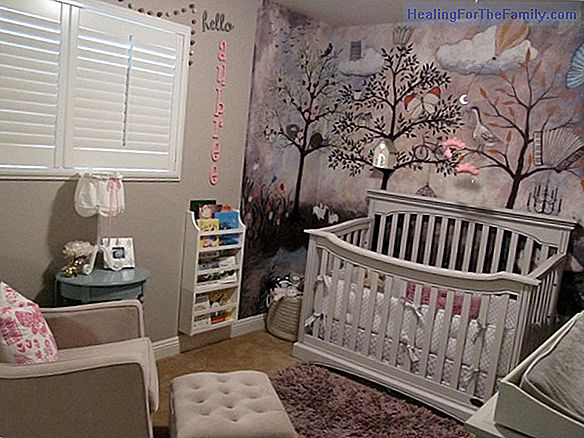How children learn to talk The development of language
The more stimuli the child receives in his first year of birth, the easier it will be to express himself and speak. Stimulation is one of the secrets to getting the child to learn to speak properly. To speak to him frequently, to listen to him with attention and to pronounce the words well, are some
The more stimuli the child receives in his first year of birth, the easier it will be to express himself and speak. Stimulation is one of the secrets to getting the child to learn to speak properly. To speak to him frequently, to listen to him with attention and to pronounce the words well, are some of the advice that the psychologist offers to us Ana Carballal, expert in Early Attention, in this exclusive interview to GuiaInfantil.com.
Language development of children and babies

1. What can parents do to make the child learn to speak?Parents are fundamental in stimulating the language of children. There are mainly three things they can do: talk to them a lot, listen to them and interact with them.
2. How can we talk to babies?We must talk to them a lot and often, using, first of all, a clear and simple language, pronouncing the words well. Parents can interact with their children, from their birth through stories and songs, affectionate phrases, and enriching the activities of daily life with words.
3. How can we listen to babies?We also learn to talk when we are talking, so what they tell us must be important. In addition to being important, if communication does not have a function and meaning for children, they will lose interest in talking, that is, if we anticipate what they need before they can communicate, communication will lose the meaning for them and they will lose curiosity and interest.
4. How do you interact with babies?The third stimulation is to interact with the child, that is, to talk and listen at the same time, and the best way to interact is play. To play with words, we can use storybooks, those that contain flaps that hide an animal or object, as well as songs that invite gestures and movements.
5. How should children aged 3 to 6 be expressed?Children from 2 to 3 years old communicate with simple sentences, they already use many adjectives, for example we also see that they begin to use adverbs and it is a significant stage because it is when the period of the questions we know so much begins. From 3 to 4 years old we already see a little more complexity and we see it, for example, in that they understand much better and that makes them respond much better to our orders and our questions, and appears for example the subordinate sentence and therefore They can express several ideas at once.
In the last period of the linguistic stage that would be from 5 to 6 years old, they acquire a lot more complexity in their language, the sentences are much more complex, we see that they use grammatical compositions that allow them to make longer sentences and also acquire the phonetic repertoire. At this moment, between 5 and 6 years old, is when they acquire the 'r' which is the hardest phoneme of all.
6. What should be the attitude of parents in the development and maturation of children's language?The attitude and influence of parents in the development of children is fundamental. The attitude of parents should be above all a positive attitude. Do not force the language but be something natural. And how we do it, because enriching daily life with a lot of language because we are a model.
Transmit a corrective feedback, when they say a word wrong we return it correctly but without correcting it, for example if the child says 'opa' instead of soup, she should say you want soup. Also avoid that when a child speaks badly, this is a grace and repeat it. Parents should help the child pronounce the words well. Repeat them as many times as necessary and seeking not to humiliate or make fun of the child's mistakes. Parents are the model for children.
7. Why do girls usually talk before children?Some statistics say that girls learn to talk before boys and point out that the woman's brain is more developed in her left hemisphere, just where speech develops. Although this is only a biological predisposition but the environment is very important, then we can encourage the development of our children's language, whether they are girls or boys.












